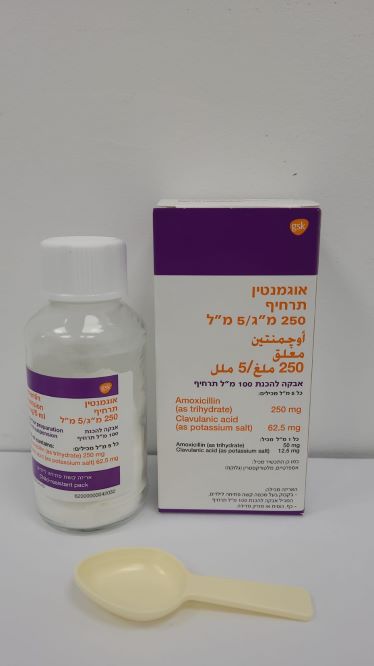Quest for the right Drug

אוגמנטין תרחיף 250 מ"ג/5 מ"ל AUGMENTIN SUSPENSION 250 MG/5 ML (AMOXICILLIN AS TRIHYDRATE, CLAVULANIC ACID AS POTASSIUM SALT)
תרופה במרשם
תרופה בסל
נרקוטיקה
ציטוטוקסיקה
צורת מתן:
פומי : PER OS
צורת מינון:
אבקה להכנת תרחיף : POWDER FOR ORAL SUSPENSION
עלון לרופא
מינוניםPosology התוויות
Indications תופעות לוואי
Adverse reactions התוויות נגד
Contraindications אינטראקציות
Interactions מינון יתר
Overdose הריון/הנקה
Pregnancy & Lactation אוכלוסיות מיוחדות
Special populations תכונות פרמקולוגיות
Pharmacological properties מידע רוקחי
Pharmaceutical particulars אזהרת שימוש
Special Warning עלון לרופא
Physicians Leaflet
Adverse reactions : תופעות לוואי
4.8 Undesirable effects The most commonly reported adverse drug reactions (ADRs) are diarrhoea, nausea and vomiting. The ADRs derived from clinical studies and post-marketing surveillance with Augmentin, sorted by MedDRA System Organ Class are listed below. The following terminologies have been used in order to classify the occurrence of undesirable effects. Very common (≥1/10) Common (≥1/100 to <1/10) Uncommon (≥1/1,000 to <1/100) Rare (≥1/10,000 to <1/1,000) Very rare (<1/10,000) Not known (cannot be estimated from the available data) Infections and infestations Mucocutaneous candidosis Common Overgrowth of non-susceptible organisms Not known Blood and lymphatic system disorders Reversible leucopenia (including Rare neutropenia) Thrombocytopenia Rare Reversible agranulocytosis Not known Haemolytic anaemia Not known Prolongation of bleeding time and Not known prothrombin time1 Immune system disorders8 Angioneurotic oedema Not known Anaphylaxis Not known Serum sickness-like syndrome Not known Hypersensitivity vasculitis Not known Nervous system disorders Dizziness Uncommon Headache Uncommon Reversible hyperactivity Not known Convulsions1 Not known Aseptic meningitis Not known Cardiac disorders Kounis syndrome Not known Gastrointestinal disorders Diarrhoea Common Nausea2 Common Vomiting Common Indigestion Uncommon Antibiotic-associated colitis3 Not known Drug-induced enterocolitis syndrome Not known (DIES) Pancreatitis acute Not known Black hairy tongue Not known Tooth discolouration9 Not known Hepatobiliary disorders Rises in AST and/or ALT4 Uncommon Hepatitis5 Not known Cholestatic jaundice5 Not known Skin and subcutaneous tissue disorders6 Skin rash Uncommon Pruritus Uncommon Urticaria Uncommon Erythema multiforme Rare Stevens-Johnson syndrome Not known Toxic epidermal necrolysis Not known Bullous exfoliative-dermatitis Not known Acute generalised exanthemous pustulosis Not known (AGEP)1 Drug reaction with eosinophilia and Not known systemic symptoms (DRESS) Symmetrical drug-related intertriginous and Not known flexural exanthema (SDRIFE) (baboon syndrome) Linear IgA disease Not known Renal and urinary disorders Interstitial nephritis Not known Crystalluria (including acute renal Not known injury)7 1 See section 4.4 2 Nausea is more often associated with higher oral doses. If gastrointestinal reactions are evident, they may be reduced by taking amoxicillin/clavulanic acid with a meal. 3 Including pseudomembranous colitis and haemorrhagic colitis (see section 4.4) 4 A moderate rise in AST and/or ALT has been noted in patients treated with beta-lactam class antibiotics, but the significance of these findings is unknown. 5 These events have been noted with other penicillins and cephalosporins (see section 4.4). 6 If any hypersensitivity dermatitis reaction occurs, treatment should be discontinued (see section 4.4). 7 See section 4.9 8 See sections 4.3 and 4.4 9 Superficial tooth discolouration has been reported very rarely in children. Good oral hygiene may help to prevent tooth discolouration as it can usually be removed by brushing. Reporting of suspected adverse reactions Reporting suspected adverse reactions after authorisation of the medicinal product is important. It allows continued monitoring of the benefit/risk balance of the medicinal product. Any suspected adverse events should be reported to the Ministry of Health according to the National Regulation by using an online form https://sideeffects.health.gov.il Additionally, you should also report to GSK Israel (il.safety@gsk.com).

שימוש לפי פנקס קופ''ח כללית 1994
lower & upper respiratory tract infections such as acute otitis media, acute sinusitis, pneumonia, exacerbation of chronic bronchitis caused by beta-lactamase producing H. influenzae and M. catarrhalis or other infections resistant to amoxycillin
תאריך הכללה מקורי בסל
01/01/1995
הגבלות
תרופה שאושרה לשימוש כללי בקופ'ח
מידע נוסף
עלון מידע לצרכן
25.03.18 - עלון לצרכן 12.04.18 - עלון לצרכן 14.07.21 - עלון לצרכן אנגלית 14.07.21 - עלון לצרכן עברית 14.07.21 - עלון לצרכן ערבית 11.06.23 - עלון לצרכן אנגלית 07.06.23 - עלון לצרכן עברית 11.06.23 - עלון לצרכן ערבית 22.08.23 - עלון לצרכן עברית 04.12.23 - עלון לצרכן אנגלית 03.12.23 - עלון לצרכן עברית 04.12.23 - עלון לצרכן ערבית 16.07.24 - עלון לצרכן עברית 29.11.16 - החמרה לעלון 07.04.21 - החמרה לעלון 25.04.21 - החמרה לעלון 31.05.21 - החמרה לעלון 22.08.23 - החמרה לעלון 09.04.24 - החמרה לעלון 16.07.24 - החמרה לעלוןלתרופה במאגר משרד הבריאות
אוגמנטין תרחיף 250 מ"ג/5 מ"ל